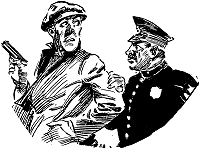
Posted 1/21/97
Come and get me, Neo-Hegelian.
Dear Mr. Morris: What is the origin of the word "cop,"
used to denote a policeman? -- Sam Weissman, via the Internet.

Funny you should mention cops. I live in New York City, which gives me the opportunity to observe just about every variety of police behavior imaginable. I also own, and occasionally listen to, a police-band scanning radio. (Yes, Virginia, it's perfectly legal.) Most of what I hear is pretty routine for New York City (riots, explosions, flying saucer landings, etc.), and the language, while often colorful, is fairly mundane. So imagine my surprise recently upon hearing an officer in the field ask his dispatcher to explain the "etiology" (a very fancy word for "cause" or "circumstances") of a situation he was being sent to investigate. Now we know where Philosophy majors end up. The dispatcher, incidentally, was not amused.
Meanwhile, back at "cop," the most commonly-heard theories trace "cop" or"copper" meaning "police" to copper buttons worn on early police uniforms, or to copper police badges supposedly issued in some cities, but there is no convincing evidence for any of this. Still other theories explain "cop" as an acronym, standing for "Constable On Patrol," "Chief of Police" or other such phrases. But these "acronym" theories bear all the hallmarks of being spurious after-the-fact explanations invented to explain "cop." Among other sticky details is the fact that acronyms were virtually unknown in English before the 20th century, while "cop" itself was well-established by the mid-19th century.
To cut to the chase, the police sense of "copper" and "cop" probably comes originally from the Latin word "capere," meaning "to seize," which also gave us "capture." "Cop" as a slang term meaning "to catch, snatch or grab" appeared in English in the 18th century, ironically originally used among thieves -- a "copper" was a street thief. But by the middle of the 19th century, criminals apprehended by the police were said to have themselves been "copped" -- caught -- by the "coppers" or "cops." And there you have the etiology of "cop." Case, as the cops say, closed.
On the bright side, it means that nothing before 1900 was genuinely phony.
Dear Evan: Can you tell me where the word "phoney" comes from? My grandfather told me that it is a form of "funny" (as in "funny money"). What do you think? -- Dan Cook, Toledo, OH.
It's ironic that the most frequently asked questions about word origins (and this is one of them, right up there with "O.K." and "posh") are so often unanswerable. Numerous origins have been proposed for "phoney," but I may as well tell you in advance that none is certain. Such is life.
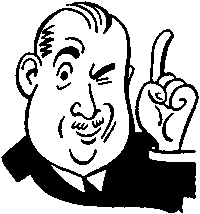 It's hard to imagine a world without such a commonplace
word as "phoney" (also spelled "phony"), but it's actually a
remarkably recent word. Its first recorded appearance was in
1900, and it is generally agreed to be of American origin. Beyond
that, things get very fuzzy. The Oxford English Dictionary, setting
the pace for most other dictionary etymologies, says tersely, "of
unknown origin." Undeterred, Merriam-Webster dictionaries until
the mid-1930's endorsed the possibility you mention, that "phoney"
is somehow a form of "funny," but this theory has since been
generally abandoned.
It's hard to imagine a world without such a commonplace
word as "phoney" (also spelled "phony"), but it's actually a
remarkably recent word. Its first recorded appearance was in
1900, and it is generally agreed to be of American origin. Beyond
that, things get very fuzzy. The Oxford English Dictionary, setting
the pace for most other dictionary etymologies, says tersely, "of
unknown origin." Undeterred, Merriam-Webster dictionaries until
the mid-1930's endorsed the possibility you mention, that "phoney"
is somehow a form of "funny," but this theory has since been
generally abandoned.
Other theories have included an attempt to tie "phoney" to "telephone," on the premise that conversations on the telephone are ephemeral and untrustworthy and thus "phoney." This theory had the notable distinction of being so awkward and silly that nearly no one believed it.
The most likely source of "phoney," in the opinion of many authorities, is an English slang word "fawney," from the Irish word "fainne," meaning "ring." English "fawney men" (con artists) perfected a scam (called the "fawney rig") which involved the trickster "finding" a gold ring "of great value" (actually brass) and then agreeing to sell it to his victim out of the goodness of his heart. When the fawney men brought their racket to America, "fawney" became "phoney," a more general and very useful synonym for fake or false.
And if you look to your left, you'll see the famous "port out."
Dear Mr. Morris: Regarding your column addressing the
problem of "sleeping tight," I had heard an explanation of the
phrase in a plantation tour (in a place not far from New Orleans,
LA). They had showed us some beds in use in the early 1800's,
and they supported the mattress on strings that had to be tightened
with some wooden pegs rather reminiscent of the tuning pegs on a
stringed instrument, and to assure a comfortable nap, one had to
keep tightening these strings. Hence the phrase "Sleep tight" -- or
so the tour guide claimed. The bed in question (if memory serves)
was some sort of "traveling" bed that people could take on a
journey, rather than a regular bed meant to stay in one place. I
don't know if it is true or not, but it might make another point of
inquiry. -- Bob Trapasso, via the Internet.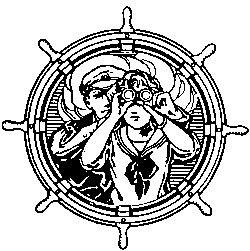
It's not uncommon for me to receive comments and often additional information from readers about words I have discussed in this column, but "sleep tight" has drawn an unusual number of letters, two of which mentioned variations on this "suspended bed" theme, in both cases recounted by tourist attraction tour guides.
I don't, however, buy the "suspended bed" theory for two reasons. First, as I said in my original column on the phrase "sleep tight and don't let the bedbugs bite," the word "tight" was commonly used in the 18th and 19th centuries to mean "soundly or thoroughly." So, far from being a mystery, "tight" in "sleep tight" has an amply documented explanation and history. And even if it were not a settled question among etymologists, I have heard no evidence for the "bed" theory except from tour guides, which leads us to my second objection.
Frankly, I have heard so many utterly absurd word and phrase origins attributed to tour guides that I have been forced to conclude that they constitute one of today's major "vectors" or carriers of unfounded etymological "urban legends." I know it must be difficult to maintain an interesting line of patter all day long, but there's still no excuse for inventing little linguistic fables out of thin air. Caveat viator -- let the tourist beware.
What's left of the greasepaint, borne off by the crowd.
Dear Mr. Morris: I do quite a bit of work in our community theatre, and have been exposed to most of the theatre lingo. However, last night, a fellow volunteer and I were wondering about the origin of the phrase "break a leg." I always thought it had something to do with dancers, but she said she had heard the phrase dated back to early (?) theatre, where there were actually wooden structures on the front of the stage called "legs." If the show went well and was well received, an audience member would celebrate by seizing one of these "legs" and breaking it. I have never heard of this, and it sounds a bit illogical to me -- who is right (if either of us)? -- Sarah Pietraszek-Mattner, via the Internet.
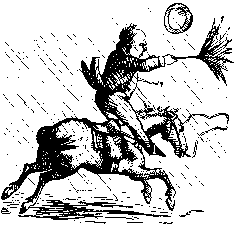 Oh, it doesn't seem so illogical to me. When I enjoy a
theatrical performance, I always make a point of destroying part of
the stage on my way out of the theater. Sometimes, if I really like what I've
seen, I even wait around outside and beat up the actors.
(Of course, I do live in New York City, so I'm willing to grant that
this may not be how it's done in Des Moines.)
Oh, it doesn't seem so illogical to me. When I enjoy a
theatrical performance, I always make a point of destroying part of
the stage on my way out of the theater. Sometimes, if I really like what I've
seen, I even wait around outside and beat up the actors.
(Of course, I do live in New York City, so I'm willing to grant that
this may not be how it's done in Des Moines.)
Speaking of legs, are you certain yours isn't being pulled? Your friend's story is by far the most bizarre explanation of "break a leg" I've ever heard, and that's saying something.
"Break a leg," of course, is how actors wish each other "good luck" before a performance, and has been commonly heard in the theater since the early 20th century. That date of origin, by the way, casts serious doubt on one of the more colorful theories about the origins of the phrase. It has been said that "break a leg" is a reference to the assassination of President Abraham Lincoln in Ford's Theatre in Washington, D.C., by John Wilkes Booth, an actor, in 1865. In attempting to flee the scene, Booth jumped from Lincoln's box to the stage, breaking his leg. The fact that actors didn't start wishing each other good luck by saying "break a leg" until more than 50 years after Lincoln's assassination makes this an unlikely source.
Next time out, we'll take a look at some of the other theories about the origins of "break a leg."
Last time out, we began exploring the origins of the phrase "break a leg," commonly used among actors to wish each other "good luck" before a performance. One of our readers reported that she had heard that the phrase came from the early days of the theater, when patrons pleased by a performance would break off parts of the stage to show their appreciation.
 I noted that this story struck me as very unlikely, as does
the popular theory that "break a leg" was actually a sardonic
reference to John Wilkes Booth's assassination of President
Lincoln in 1865. (Booth, an actor, broke his leg attempting to flee
the scene.) Although "break a leg" is commonly heard today, it
was first recorded in print in the early 20th century, which makes it
too recent a coinage for either of those theories to be true.
I noted that this story struck me as very unlikely, as does
the popular theory that "break a leg" was actually a sardonic
reference to John Wilkes Booth's assassination of President
Lincoln in 1865. (Booth, an actor, broke his leg attempting to flee
the scene.) Although "break a leg" is commonly heard today, it
was first recorded in print in the early 20th century, which makes it
too recent a coinage for either of those theories to be true.
All of which puts us back at square one, but fortunately the peerless Eric Partridge rides to our rescue. Partridge was to the collection and documentation of slang what Shakespeare was to the theatre, and in his Dictionary of Catchphrases, he has quite a bit to say about "break a leg." After dismissing the John Wilkes Booth story, Partridge explains that he favors the theory that "break a leg" originated as a translation of a similar German catchphrase "Hals- und bienbruch," with which German actors wish their colleagues "a broken neck and a broken leg." The German phrase seems to have begun life among aviators, possibly during World War I, and gradually spread to the German theatre and then to the British and American stages.
But why, I hear you ask, would someone wish injury and ill-fortune on a comrade embarking on a perilous mission? Simple -- popular folklore down through the ages is full of warnings against wishing your friends good luck. To do so is to tempt evil spirits or demons to do your friend harm. Better to outwit the demons (who must be rather dim, it seems to me) by wishing your friend bad fortune.
The charm doesn't always work, of course. The stage directions for opening night last year of the reconstructed Globe Theater in London supposedly called for two actors to swing dramatically from a balcony down to the stage on ropes. One of the actors slipped and, you guessed it, broke his leg.
He's no fun, he fell right over.
Dear Evan: While visiting my relatives in Western New York, my sister (who is a "Big Wheel" in the local historical society) made the claim that the term "Big Wheel" had local (Niagara County) origins, originating from a local upper class club of rich guys who liked to ride the Pennyfarthing-type bicycles - the ones with the big front wheel. The name of the club was the "Big Wheels" - and since they were upper-crust/rich/important, etc., a member of the "Big Wheels Club" got to be known as a "Big Wheel," hence "Big Wheel" meaning an important person. Is there any truth to this story, or is it just another interesting but untrue piece of lore? -- Bob Trapasso, via the Internet.
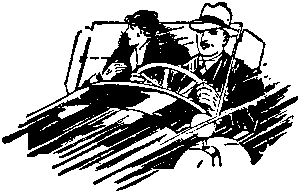 I'll take Number Two, Bob -- "Just another interesting but
untrue piece of lore." But before we delve into the wonderful
world of wheels-as-cultural-metaphors, a word about the
"pennyfarthing" bicycle. As you say, the term refers to the old-style bicycle, popular in the 19th century, which had a very large
front wheel, no gears or chain, and a very small rear wheel. Don't
go looking for the Mr. Pennyfarthing who invented the device,
folks -- the name refers to the relative sizes of the wheels (the
British penny of that time being quite a bit larger than a farthing).
I'll take Number Two, Bob -- "Just another interesting but
untrue piece of lore." But before we delve into the wonderful
world of wheels-as-cultural-metaphors, a word about the
"pennyfarthing" bicycle. As you say, the term refers to the old-style bicycle, popular in the 19th century, which had a very large
front wheel, no gears or chain, and a very small rear wheel. Don't
go looking for the Mr. Pennyfarthing who invented the device,
folks -- the name refers to the relative sizes of the wheels (the
British penny of that time being quite a bit larger than a farthing).
There are several little problems with the story your sister has heard about "big wheel." (Notice how diplomatic I am? If your sister is anything like mine, I'd suggest you follow my example when you explain this to her.) First, "big" has been a common American synonym for "important" since the early 18th century. "Big wheel" is just one of many slang terms for someone important that have cropped up over the last 200 years, "big shot," "big cheese," "big chief," "Mr. Big" and "big wig" being notable examples. So we didn't need a bicycle to equate "big" with "powerful."
Ordinarily, I'd be willing to believe that there was such a Ritzy Riders Club in your sister's town way back when, and that someone might have made a pun about the "big wheels" riding "big wheels," thus providing at least a partial basis for the story. But there's a problem with that, too. The phrase"big wheel" isn't found anywhere in print until 1927, and didn't become popular slang until the 1940's, long after the last pennyfarthing bicycle was consigned to a museum. So they might have been called "Big Shots on Bikes," but probably not "Big Wheels."
Take me back to the main Word Detective page.
Take me to the Index of back columns.
All contents Copyright © 1997 by Evan Morris.